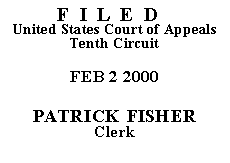 UNITED
STATES COURT OF APPEALS
UNITED
STATES COURT OF APPEALS
 UNITED
STATES COURT OF APPEALS
UNITED
STATES COURT OF APPEALS
TENTH CIRCUIT
| CHARLES RONALD COOPER, | |
| v. | No. 99-1437 |
| MARK McKINNA, Warden of the Respondent; CROWLEY COUNTY CORRECTIONAL FACILITY; JOHN W. SUTHERS, Executive Director for the Colorado Department of Corrections; BILL OWENS, Governor for the State of Colorado, | (D.C. No. 99-Z-1030)
(D. Colo.) |
ORDER AND JUDGMENT(*)
Before BALDOCK, HENRY, and LUCERO Circuit Judges.(**)
Petitioner Charles Ronald Cooper, proceeding pro se, appeals the district court's dismissal of his petition filed under 28 U.S.C. § 2241 but construed under 28 U.S.C. § 2254. Additionally, before us is Petitioner's objection to the requirement of a certificate of appealability. See 28 U.C.S. § 2253(c). We exercise jurisdiction pursuant to 28 U.S.C. § 1291, and affirm.
Petitioner is in the custody of the Colorado Department of Corrections after state sentencing on various robbery and burglary convictions in April and May of 1993. At the time he filed his petition, Petitioner was incarcerated at the Crowley County, Colorado, facility, but has since been transferred to the facility at Sterling, Colorado. In the past several years, the Colorado DOC has also transferred Petitioner to private facilities in Texas and Minnesota. Petitioner does not challenge his conviction or sentence. Instead, Petitioner filed a petition pursuant to § 2241 in which he argues the DOC illegally transferred him from Colorado to Texas and Minnesota. Specifically, Petitioner claims the state DOC has waived jurisdiction over him because the contracts under which the DOC transferred him to the private out-of-state facilities violate the federal Constitution, Colorado state law, and an interstate corrections compact.
The district court construed the petition under 28 U.S.C. § 2254 because Petitioner is in state custody. While noting Petitioner's failure to exhaust his available state remedies, the district court went on to deny the petition on the merits. Consequently, the district court dismissed the petition. The district court subsequently denied Petitioner a certificate of appealability. Petitioner appeals, objecting to the requirement of a certificate of appealability.
The district court construed Petitioner's § 2241 petition as a § 2254 petition simply because Petitioner is in state custody. Petitioner, however, properly filed his petition under § 2241. Section 2241 proceedings are used to attack the execution of a sentence while § 2254 proceedings, in contrast, are used to collaterally attack the validity of a conviction and sentence. See Ayala v. Department of Corrections, 1999 WL 1020847, at *1 (10th Cir. Nov. 10, 1999) (unpublished) (citing McIntosh v. United States Parole Comm'n, 115 F.3d 809, 812 (10th Cir. 1997)). In the present case, Petitioner does not challenge his underlying conviction or sentence. Instead, he alleges that the DOC illegally transferred him to private out-of-state facilities to serve portions of his sentence. Accordingly, Petitioner properly filed his petition pursuant to § 2241.
A state prisoner bringing a federal habeas corpus action under either § 2241 or § 2254 bears the burden of showing he exhausted available state remedies. Coleman v. Thompson, 501 U.S. 722, 731 (1991). See also Ayala, 1999 WL 1020847, at *1; Cooper v. Schear, 1999 WL 14047, at *3 (10th Cir. Jan. 15, 1999) (unpublished). To satisfy the exhaustion requirement, Petitioner must first raise all federal constitutional claims in the state courts, and if those courts rule against him, he may then present the same claims to the federal district court. Cooper, 1999 WL 14047, at *3. Despite the district court's erroneous treatment of Petitioner's § 2241 petition as a § 2254 petition, Petitioner must exhaust state remedies. Petitioner, however, does not allege that he has exhausted his state remedies and the record does not contain any indication that Petitioner exhausted his state remedies. Accordingly, we affirm the district court's judgment of dismissal but direct that the district court's dismissal be without prejudice for failure to exhaust state remedies.(1)
AFFIRMED AS MODIFIED.
Entered for the Court,
Bobby R. Baldock
Circuit Judge
*. This order and judgment is not binding precedent, except under the doctrines of law of the case, res judicata, and collateral estoppel. The court generally disfavors the citation of orders and judgments; nevertheless, an order and judgment may be cited under the terms and conditions of 10th Cir. R. 36.3.
**. After examining the briefs and appellate record, this panel has determined unanimously that oral argument would not materially assist the determination of this appeal. See Fed. R. App. P. 34(a)(2)(c); 10th Cir. R. 34.1(G). The case is therefore ordered submitted without oral argument.
1. We note that a certificate of appealability is not required to appeal the denial of a petition brought pursuant to § 2241. See McIntosh v. United States Parole Comm'n, 115 F.3d 809, 810 n. 1 (10th Cir. 1997); Kuehner v. Guzik, 1999 WL 1246917, at *1 (10th Cir. Dec. 23, 1999) (unpublished) . Therefore, Petitioner's objection to the requirement of a certificate of appealability is well taken.